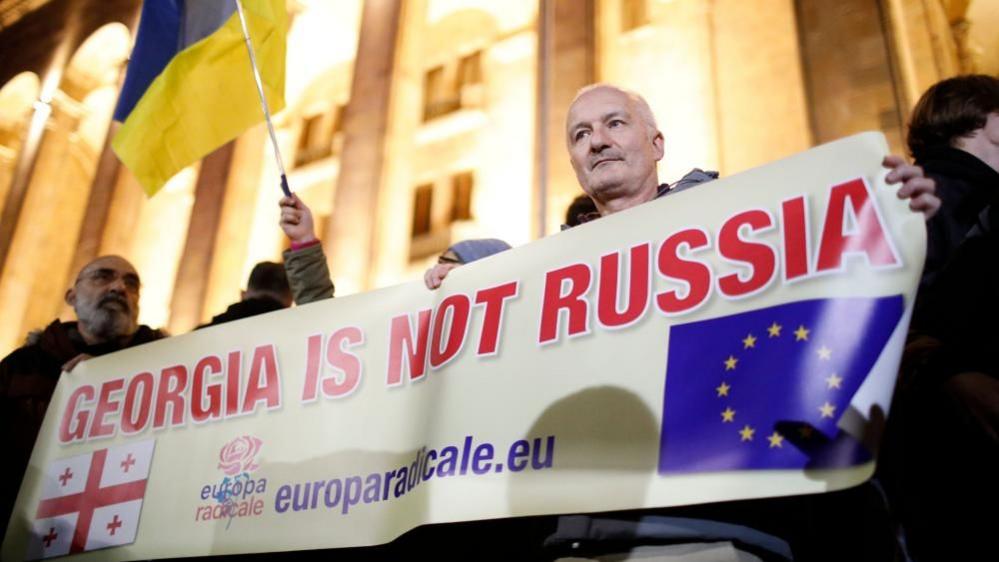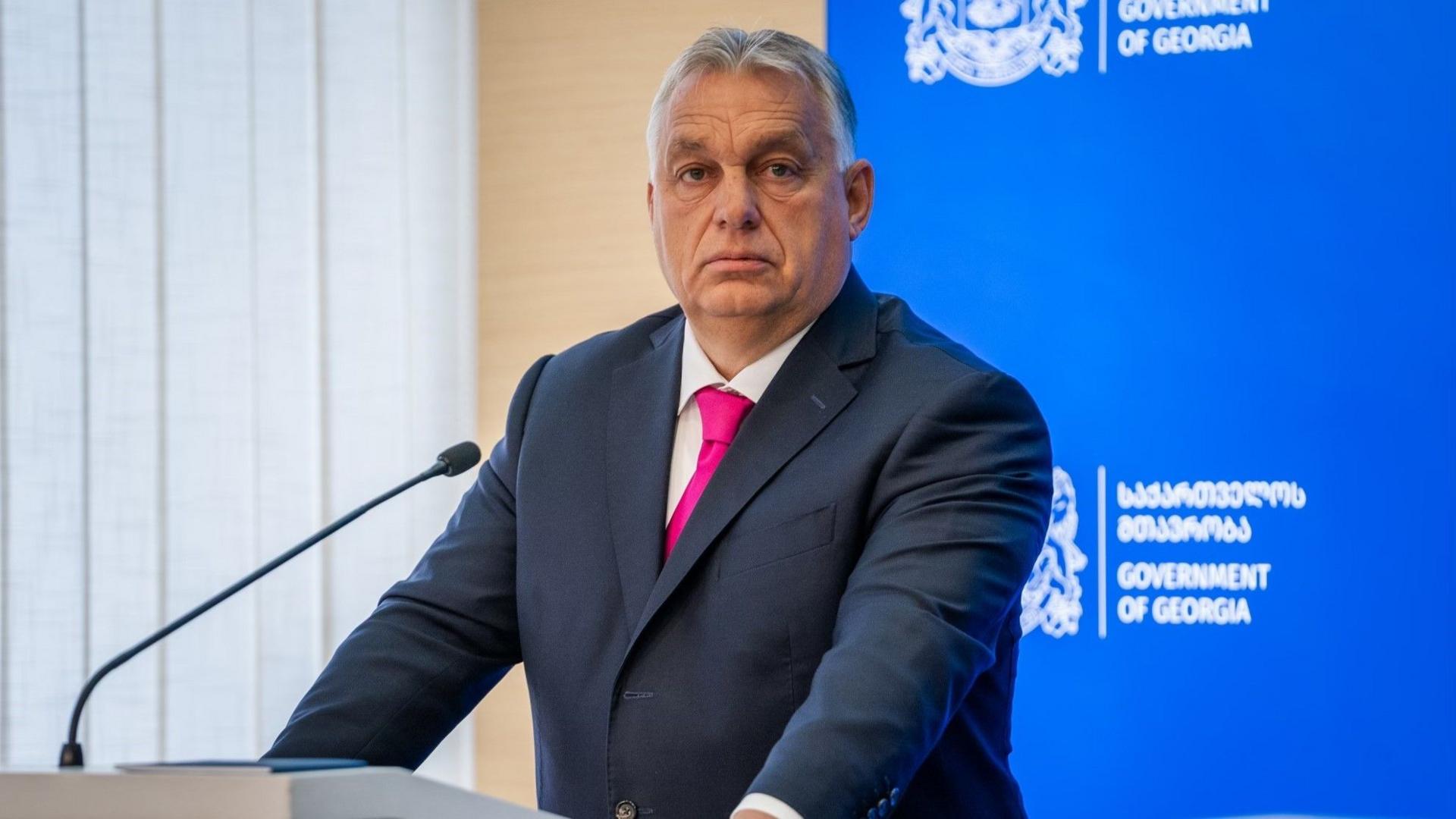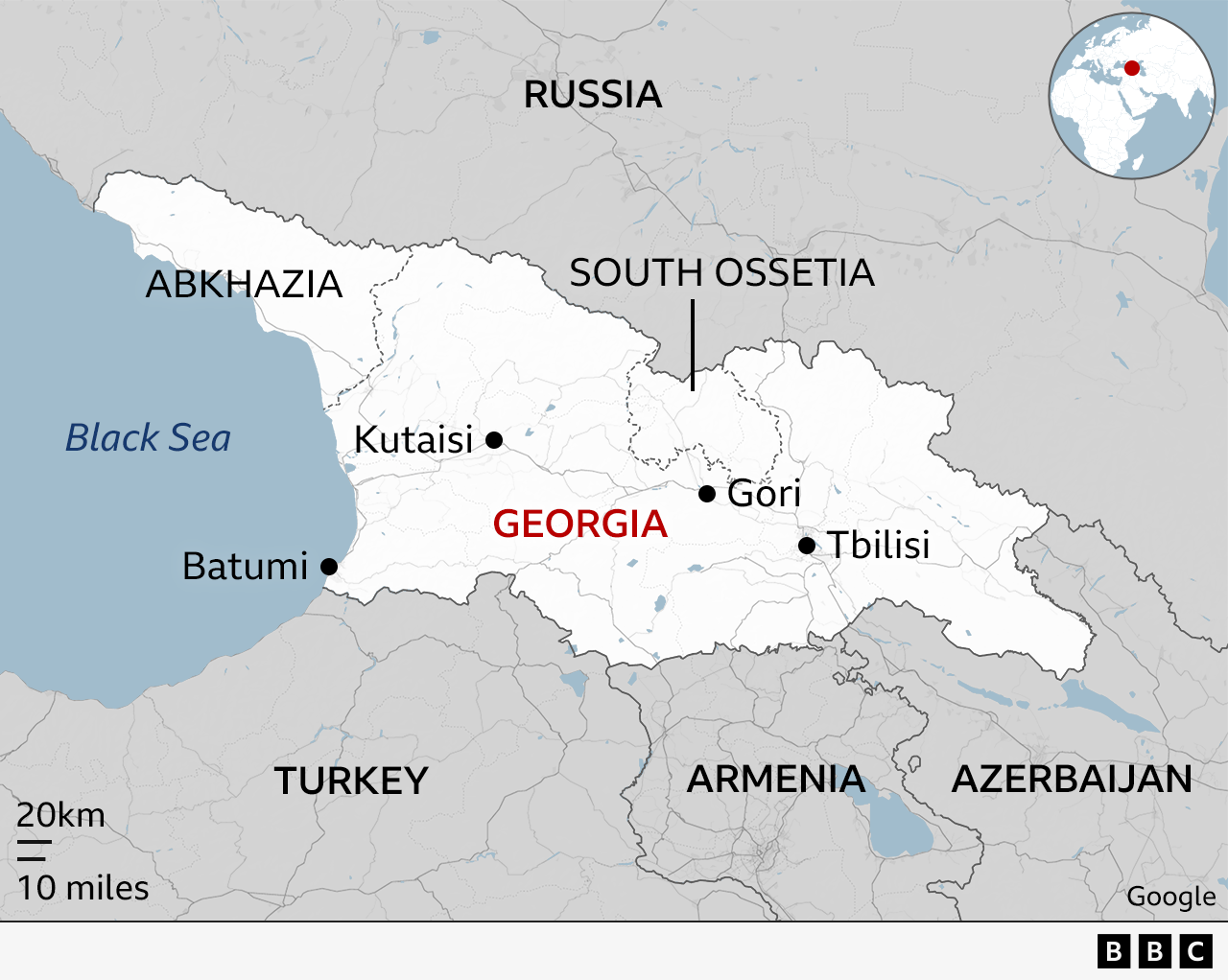Biden alarmed at Georgia's disputed election and 'Russian laws'

Thousands of protesters demonstrated against the contested result on Monday night
- Published
US President Joe Biden has called on the Georgian government to respond to international concern at the scale of violations in Saturday's election and repeal recent Russian-style laws.
The Georgian Dream government in the South Caucasus state, which borders Russia, claimed a fourth term in power after election authorities said it had won almost 54% of the vote.
"I have been deeply alarmed by the country’s recent democratic backsliding,", external Biden said, echoing concerns by the European Union, which has frozen Georgia's bid for membership and described latest developments as "deeply worrying".
Georgia's pro-Western president, Salome Zourabichvili, has refused to recognise the result.
She has spoken of a "Russian special operation" to influence the outcome and backed four opposition groups, who say the vote was "stolen" by an increasingly authoritarian party moving Georgia back into Russia's orbit under billionaire founder Bidzina Ivanishvili.
The US and EU have both called for an investigation into a catalogue of examples of intimidation, violence and ballot-stuffing, as well as alleged flagrant violation of the new electronic voting process.
European Commission President Ursula von der Leyen said Georgians had "a right to see that electoral irregularities are investigated swiftly, transparently and independently".
However, the US president's statement will sting the Georgian Dream leadership most, because it is most likely to cut through to Georgia's 3.7 million population.

Hungarian PM Viktor Orban's visit to Georgia has been widely criticised by other EU states
Georgian Dream's prime minister, Irakli Kobakhidze, has sought to shrug off criticism of the poll. He told the BBC there were incidents in only a couple of polling stations, while in all the others "the environment was completely peaceful".
On Tuesday, he shared a platform with Hungary's Viktor Orban, who travelled to Tbilisi to praise the vote as "free and democratic".
Orban made no mention of the numerous allegations of vote violations and his visit annoyed many of the EU's 27 member states.
Thirteen foreign ministers said he did not speak on behalf of the EU, while Brussels contradicted Orban, making it clear observers had not declared the elections to be free and fair, external. It said developments in Georgia were "very worrying".
In recent months, Georgian Dream has passed a Russian-style "foreign agents" law targeting media and non-government groups that receive foreign funding, as well as a law curbing LGBT rights.
Georgians join mass rally as president urges protest at 'rigged vote'
- Published28 October 2024
Georgia PM rejects vote-rigging claims in BBC interview as president calls mass rally
- Published28 October 2024
Orban, who had congratulated the Georgian Dream government even before the result was declared on Saturday night, also took a swipe at his EU partners.
"European politics has a manual. If liberals win, they say it’s democratic, but if conservatives win, there's no democracy," he told reporters after talks with Kobakhidze.
"Here the conservatives won, so these are the disputes - you shouldn't take them too seriously."
Viktor Orban arrived in Tbilisi on Monday night, a short distance from a large demonstration of tens of thousands of Georgians protesting against the result.
Hungarian Foreign Minister Peter Szijjarto, who was also in Tbilisi, said it was a disgrace that the EU had not recognised the result of the Georgian vote.
Western exit polls for opposition TV channels suggested that four opposition parties combined had won the election, before the Central Election Commission declared Georgian Dream the winner with a majority in parliament.
Georgia president calls on Georgians to protest
Georgian monitoring group "My Vote" has compiled an exhaustive list of the types of violations that its 1,500 observers documented on Saturday and in the run-up to the vote.
My Vote said that ahead of the election, public teachers, cleaners and bus drivers were either asked to send in their IDs or had them confiscated, while families of vulnerable people were offered financial help in return for their vote.
On the day of the election, My Vote says several different schemes were used:
There was vote-buying and ballot-stuffing, while observers were prevented from doing their job
Election officials and authorities did not respond to allegations of criminal offences
The system of inking voters' fingers was not carried out properly, so voters could vote again elsewhere
Voters were able to use other people's ID numbers to cast their ballots with the complicity of election officials
Voters were able to collect numerous ID numbers by going from polling station to polling station.
President Zourabichvili had already told the BBC that so-called carousel voting had taken place, "when one person can vote 10, 15, 17 times with the same ID".
My Vote has called for the results from 196 polling stations to be annulled, alleging that they accounted for an extra 300,000 votes.
Georgia's prime minister has denied allegations of widespread irregularities, telling the BBC the elections were generally "in line with legal principles". He has also denied that his government is pro-Russian and "pro-Putinist".
Georgia's beleaguered election commission has accused its critics of a "manipulative campaign" of disinformation and said it would recount votes in five randomly selected polling stations in each of Georgia's 84 election districts.
The commission says the US company whose system it used maintained that "duplicating a voter on the voter list is impossible, external, as each voter is registered only once".
"It is impossible to vote multiple times with a single ID, undergo double verification, or have a single voter registered across multiple precincts," the commission added, adding that trying to discredit the system was no more than denying reality.
The Georgian president told Swiss radio that the commission was "completely dominated by the party of power, and non-government organisations... have no influence over it".
"This state is captured," said Eka Gigauri of Transparency International, which was involved in the My Vote monitoring mission.
"We know anything might happen... and we know no-one will investigate it or react."
